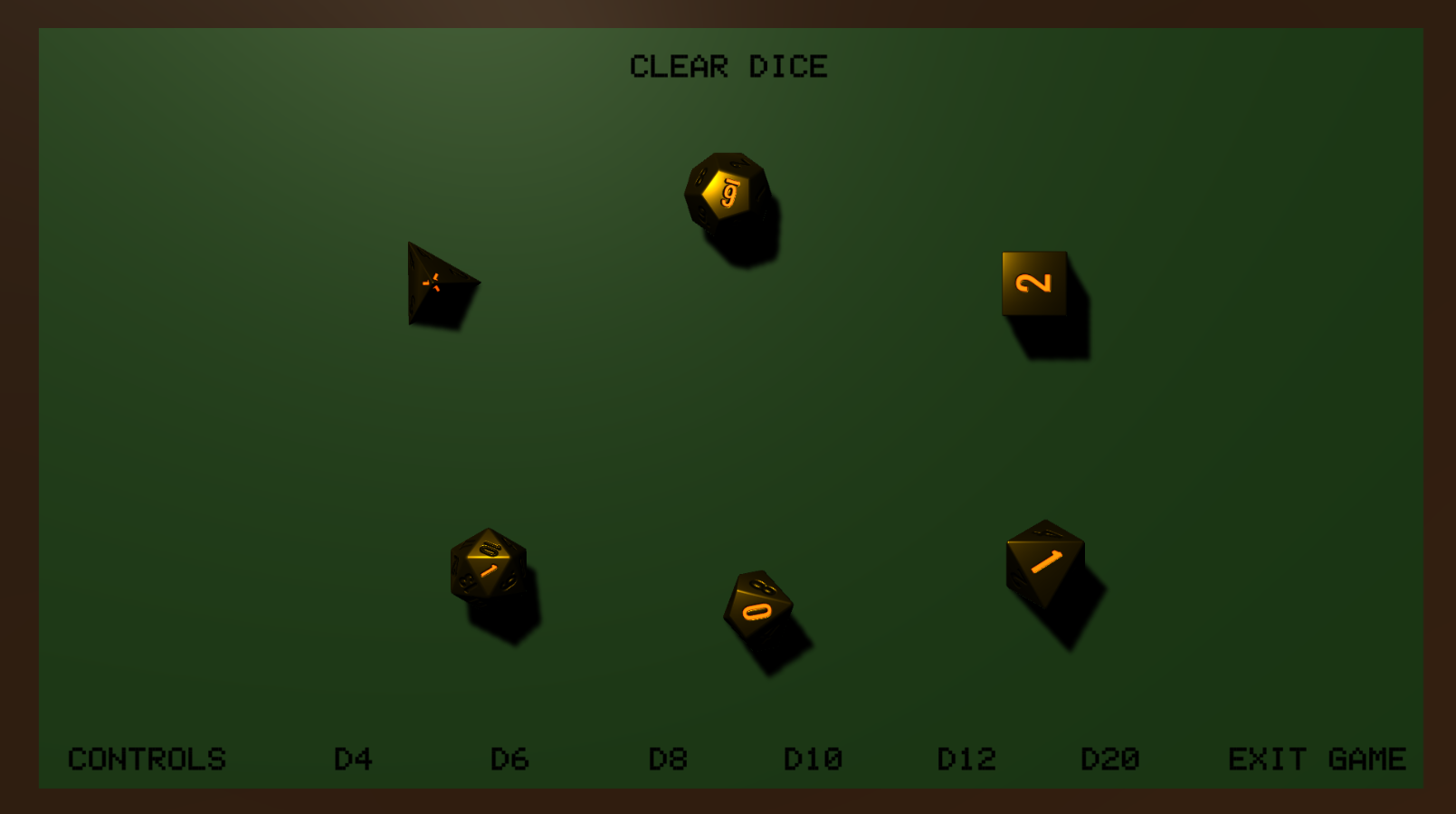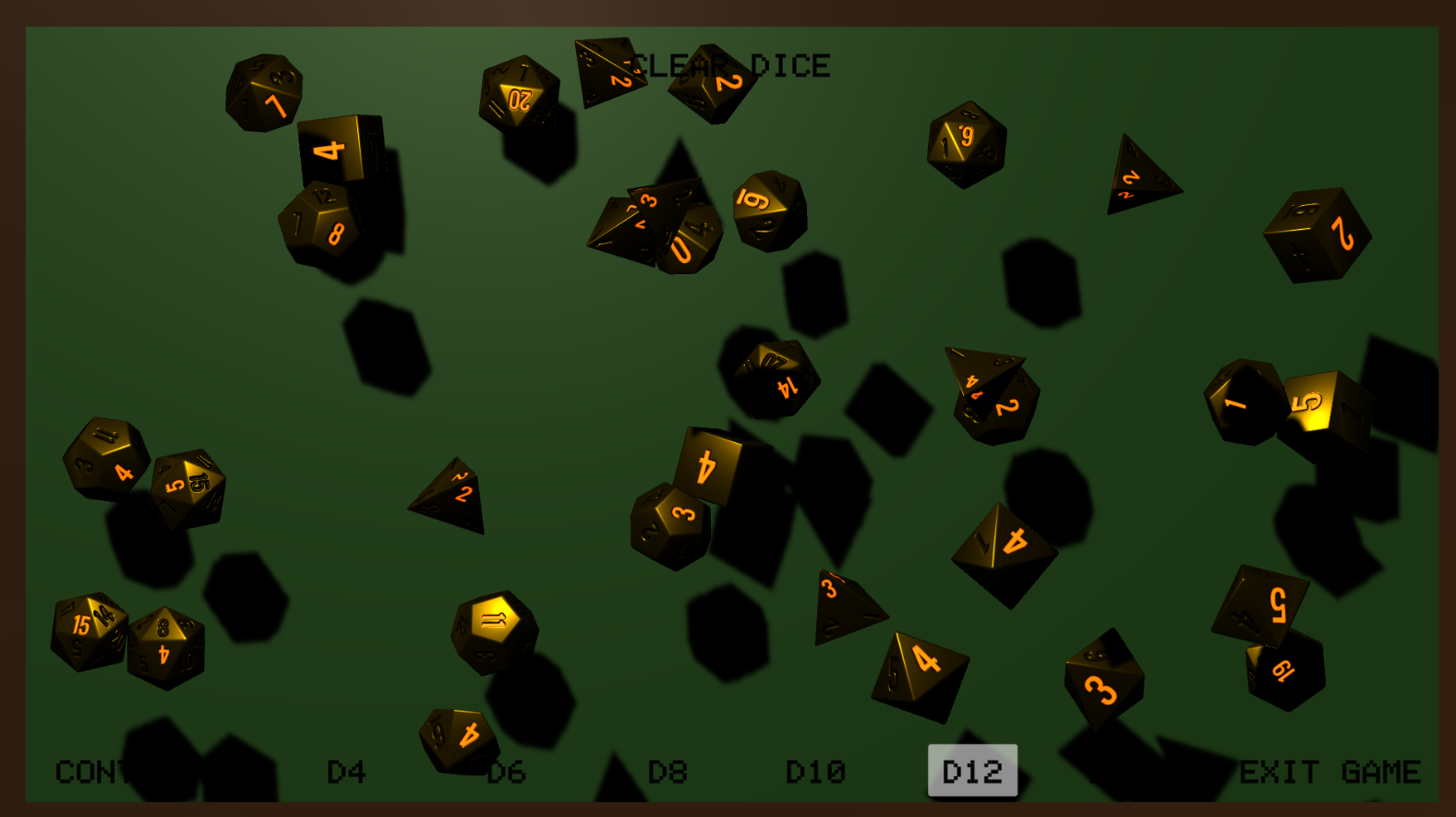Dice by PCalc, is a physics-based simulation of polyhedral dice for use in tabletop role-playing games with dungeons and/or dragons. Featuring near-photorealistic 3D graphics, it comes with a variety of gorgeous dice sets. Throw multiple dice with advantage or disadvantage, and any given modifier. Java based dice roller. Apr 8th 2013, 13:14 GMT. 176 downloads; 1 KB; Yahtzee 1.0. Free and open source clone of the classic dice game Yahtzee. Apr 30th 2009, 02:47 GMT. Mac OS X (PPC & Intel) 1,324 downloads; 57 KB; Dice 1.0. A fun dice roller for the Mac's Dashboard. Free and Open Source empire-building strategy game: freediameter: 1.5.0: Open source Diameter (Authentication) protocol implementation: freedink: 109.6: Portable version of the Dink Smallwood game engine: freeglut: 3.2.1: Open-source alternative to the OpenGL Utility Toolkit (GLUT) library: freeimage: 3.18.0: Library for FreeImage, a dependency.
- Physics Based Dice Roller Mac Os Catalina
- Physics Based Dice Roller Mac Os X
- Physics Based Dice Roller Mac Os 11
- Physics Based Dice Roller Mac Os Download
Non-Conventional Dice Roller
Use the following virtual dice roller to mimic dice that have a different number of faces from the conventional 6-faced die. The most common physical dice have 4, 6, 8, 10, 12, and 20 faces respectively, with 6-faced die comprising the majority of dice. This virtual dice roller can have any number of faces and can generate random numbers simulating a dice roll based on the number of faces and dice.
A dice is typically a small, throwable object that has multiple faces (most commonly six) and possible positions that indicate a number (or something else), used for generating random numbers and events. They are typically used for tabletop games, which includes a wide variety of games, as well as for gambling. Examples of tabletop games that involve the use of dice include games like backgammon, Boggle, and Yahtzee, where dice are a central component of the game. Some other well-known tabletop games include Monopoly, Risk, Dungeons and Dragons, and Settlers of Catan. There are however, numerous others.
Dice shapes
The most commonly used dice shapes are shown in the image, and listed below.
- Tetrahedron: 4 faces – the blue die
- Cube: 6 faces – the orange, cubic die
- Octahedron: 8 faces – the green die
- Pentagonal trapezohedron: 10 faces – the orange, non-cubic die
- Dodecahedron: 12 faces – the yellow die
- Icosahedron: 20 faces – the purple die
Although the image shows some of the more common die shapes, there are many other polyhedral dice, or dice of other shapes. There are also non-numeric dice, dice that do not follow a counting sequence that begins at one, and spherical dice.
How random is a dice?
Based on probability, a die should have an equal probability of landing on each of its faces. However, this is not necessarily the case with mass produced dice as they cannot be truly random, since it is difficult to mass produce dice that are uniform, and there may be differences in the symmetry of the dice. Each dice, particularly d20 (20-sided polyhedral dice) and d8 (8-sided polyhedral dice) is often unbalanced, and more likely to roll certain numbers.
How to test how random your dice is:
Although it may not be the most accurate way to test how random your dice is, one relatively quick test you can do involves just a container, some water, and some salt:
- Get a container that can fit the die you want to test
- Fill the container with water, then add salt and the die to the water – if the die doesn't float, add more salt until the die floats
- Flick the die and take note of which side faces upwards – repeatedly flick the dice and record the results
For a well-balanced die, you can expect a variety of numbers. If it is not well balanced, you will be more likely to notice certain numbers occurring more often. However, unless this test is performed numerous times, or the dice is heavily unbalanced, the user is not likely to notice a significant difference.
There are a number of companies that manufacture dice, and some more rigorous tests (than the one described above) have been performed on dice manufactured by different companies in an effort to determine how truly random the dice (mostly d20 dice) are. These studies confirmed that even dice manufactured within the same company under the same conditions can vary significantly from each other, and are not truly random. Some companies produced dice that were more random than others, but even then, were not found to be truly random.
Virtual dice, like the one above, are almost always based on pseudo-random number generating algorithms, which are also not truly random. However, a virtual dice roll is likely more close to true randomness than most physical dice.
Delivering a high-quality product at a reasonable price is not enough anymore.
That’s why we have developed 5 beneficial guarantees that will make your experience with our service enjoyable, easy, and safe.
Money-back guarantee
Physics Based Dice Roller Mac Os Catalina

You have to be 100% sure of the quality of your product to give a money-back guarantee. This describes us perfectly. Make sure that this guarantee is totally transparent.
 Read more
Read morePhysics Based Dice Roller Mac Os X
Zero-plagiarism guarantee
Each paper is composed from scratch, according to your instructions. It is then checked by our plagiarism-detection software. There is no gap where plagiarism could squeeze in.
Read moreFree-revision policy
Physics Based Dice Roller Mac Os 11
Thanks to our free revisions, there is no way for you to be unsatisfied. We will work on your paper until you are completely happy with the result.
Read morePrivacy policy
Your email is safe, as we store it according to international data protection rules. Your bank details are secure, as we use only reliable payment systems.
Physics Based Dice Roller Mac Os Download
Read moreFair-cooperation guarantee
By sending us your money, you buy the service we provide. Check out our terms and conditions if you prefer business talks to be laid out in official language.
Read more